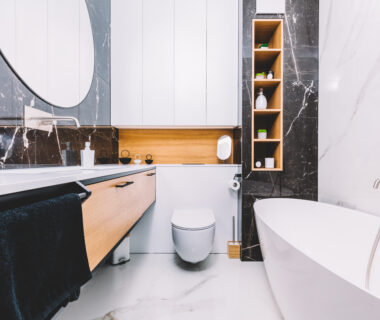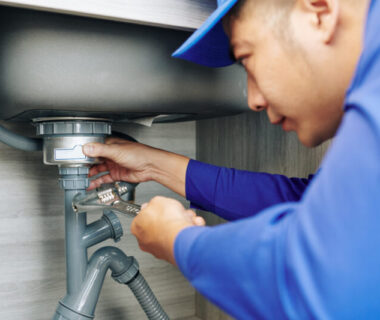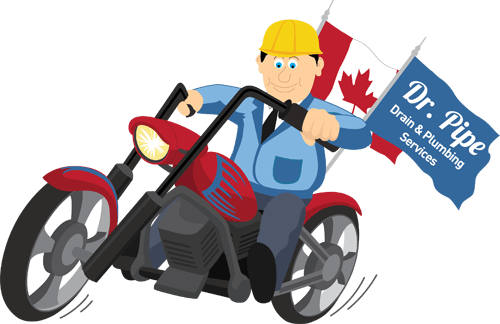Who Fixes What? Plumbing Responsibilities in Condos

Did you know there are close to 900,000 residential condo units in Ontario? So says the Condominium Authority of Ontario, which adds that around 55% of dwellings under construction are…you guessed it…condos.
Let’s face it. Condo living has its benefits — including the shared nature of maintenance and repairs. If you own a single-family home in Toronto or elsewhere in the GTA, the responsibility for upkeep falls on your shoulders. Owning a condominium unit, however, affords a shared approach to property maintenance. The shared model distributes the costs among the various unit owners in the condominium. The unit owners split the costs for external repairs, landscaping, trash removal, and shared amenities like pools and fitness facilities that are managed by the building’s management.
If you live a busy lifestyle, already feel stretched thin, and want a better work-life balance, condo ownership might be preferable to homeownership.
Here’s How Your Condo Plumbing System Functions
How does plumbing work in an apartment building? Condo plumbing responsibility is something worth considering if you live in or want to move to a condo. All plumbing systems use drain pipes and separate pressurized pipes that carry potable water from the municipal system. You can access the water in your condo unit through the sink, bathtub, shower, dishwasher, washing machine, and toilet fixtures.
Drainage systems, meanwhile, funnel wastewater from your condo unit through sewer pipes destined for a municipal wastewater treatment facility.
Drain Pipes and Potable Water Pipes Remain Separate
Condo plumbing responsibility in Toronto is something you need to understand before getting the keys to your condominium unit. One thing to understand is potable water. Potable water is clean water — water you can drink, cook with, and bathe — without worrying about the aftermath. Wastewater, however, must be kept separate from potable water lines.
That’s also why condo plumbing codes mandate that condos install backflow valves in plumbing systems. These safety features prevent wastewater or treated water from contaminating fresh potable water.
Plumbing Responsibilities in Condominiums: Who is Responsible?
While condo unit holders share a plumbing system, individual condo owners may find themselves holding the short end of the stick for water leaks, bursts, or clogs. It can be tricky to figure out who’s responsible in such cases. Plumbing is often looked at in terms of “public” pipes looked after by the condo corporation and “tenant-owned” pipes inside condo units.
Most condos make these responsibilities clear so nothing’s left up for interpretation. That’s not something you should accept considering the investment you make to own a condo. The average price for a condo in the final quarter of last year was $689,198, according to the Toronto Regional Real Estate Board. That’s not chump change. In general terms, plumbing within the interior walls of the condo — like supply lines, risers, and pipes serving multiple units — is handled by the building management. Meanwhile, condo owners are responsible for plumbing fixtures inside their units. Those things include toilets, washing machines, sinks, toilets, tubs, and the drain lines going from their units to the main vertical pipe.
In addition to the above, condo plumbing systems involve shared sections of public pipes, and that can complicate things as far as who is responsible.
Pro recommendation: Ensure your condo has a detailed schematic of the plumbing system available so you know who is responsible for pipes in condo walls in your unit and in public areas.
Exceptions to the Rule: Limited Common Elements
As is often the case, there are exceptions to the general rule. Exceptions are related to “Limited Common Elements,” which are areas of the property reserved for the exclusive use of specific units. These areas are still technically owned by the building management. Patios, balconies, and certain infrastructure components like water heaters and HVAC systems are examples.
Exceptions Related to Carelessness or Modifications
As a unit owner, you could face certain exceptions due to negligence or modifications. If a plumbing fixture fails because of a lack of upkeep and causes water damage, you could be on the hook for any repairs required to the affected unit and common areas. You could also be forced to take financial responsibility if you alter your plumbing system.
Key Plumbing Problems in Condominiums
- Water Leaks: The responsibility for maintenance and repairs depends on the source. Leaks from common elements, like exterior walls or the roof, are typically managed by the property managers. Leaks within private units are generally the unit owner’s responsibility.
- Blocked Drains: If the drains in your condo unit get blocked up, the responsibility is yours. The building management, however, must correct any issues related to a blockage in the main sewage line serving the building.
- Water Damage: Water damage stemming from a leak in a shared area is the responsibility of the building management. However, water damage resulting from problems within a unit, like an overflowing kitchen sink, usually falls to the unit owner. You’ll have to foot the bill for any damage to your personal property in such cases.
- Burst Pipes: Burst pipes in shared areas, such as those serving the building’s central heating system, are the responsibility of the building management. However, a burst pipe within a unit is generally the owner’s responsibility.
- Sewer Back Up: If you’ve used the toilet, flushed it, and watched in horror as it overflowed onto the floor, you know that’s a smelly problem. A backed-up sewer is an especially nasty scenario for any condo owner. When a clogged waste stack or main sewer line happens in a condo, multiple units may get affected. The corporation should take care of a clog in the main sewer line or waste stack, but a pro plumber will assess clogs between shared units to decide who covers the expense.
- Corrosion of Potable Water Pipes: The owner is responsible for corroded pipes within the unit. Corrosion within public bathrooms or the kitchen in the party room, however, is usually the corporation’s problem.
Dr. Pipe Drain and Plumbing Services Cares About Your Condo Plumbing
Let us diagnose and repair plumbing issues in your condo before they worsen into more severe and costly problems. Pipelining is one of the techniques we employ. It involves lining your plumbing system with an epoxy coat to seal small leaks and prevent more severe corrosion.
Our troubleshooting and repair process is designed to keep your condo plumbing system functioning longer without damaging your fixtures or drywall.
For more information, give us a call and speak to one of our courteous and helpful plumbers at 416 663 4777!
Our Plumbing Professionals Offer Round-the-Clock Condo Plumbing Services for Toronto and the Greater Toronto Area
Do you want to know who is responsible for pipes in condo walls in Ontario? Are you clueless about condo plumbing responsibility? When the situation calls for emergency plumbing services, contact us at Dr. Pipe. We offer 24/7 emergency services to give you a hand when you’re responsible for repairs. You can count on us to arrive on time and offer the emergency repair you need. Condo living can be stressful if you have plumbing issues. You might wonder who is responsible for damage, the cost of repairs, or if you have to foot the bill for damage to other units. We’ll explain it all!
Check Out Our 5-Star Client Feedback!
Do you want to find a reliable plumber? Your best bet is to check online reviews from homeowners in Toronto and the surrounding region.
At Dr. Pipe Drain and Plumbing, we have a 4.9 customer satisfaction rating on Google Maps. Our customers trust us, and the customer satisfaction rating shows this.
Plumbing Service Area in Toronto and the Greater Toronto Area
Dr. Pipe’s plumbing professionals are available throughout Downtown Toronto and the GTA, including Aurora, Scarborough, Vaughan, East York, East Gwillimbury, Mississauga, King, Newmarket, Markham, and Richmond Hill. Whether you need help with your condominium drainage system, have questions about the drainage systems, wish to learn more about condo plumbing responsibility, or for any other reason, get in touch.
Our troubleshooting and repair process is designed to extend the life of your condo plumbing system without damaging your fixtures or drywall.
For more information, contact one of our friendly and helpful plumbers at 416 663 4777!
Let Dr. Pipe Drain and Plumbing Solve Your Plumbing Problems
Dr. Pipe is fully insured and licensed. With many years of experience serving our clients in Ontario, we’ve built a clean reputation. Our workers are also both certified and experienced. Therefore, you can trust us to do it right the first time.




